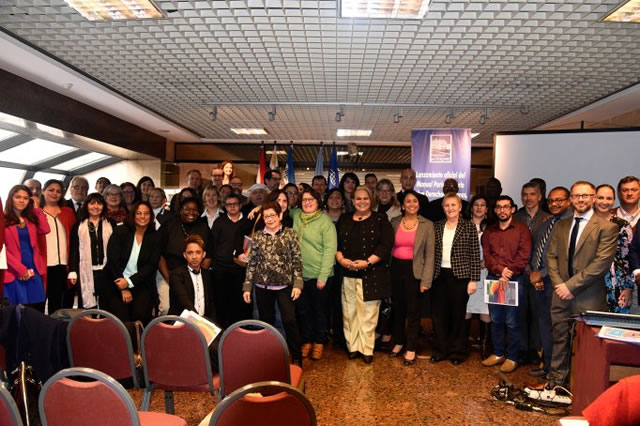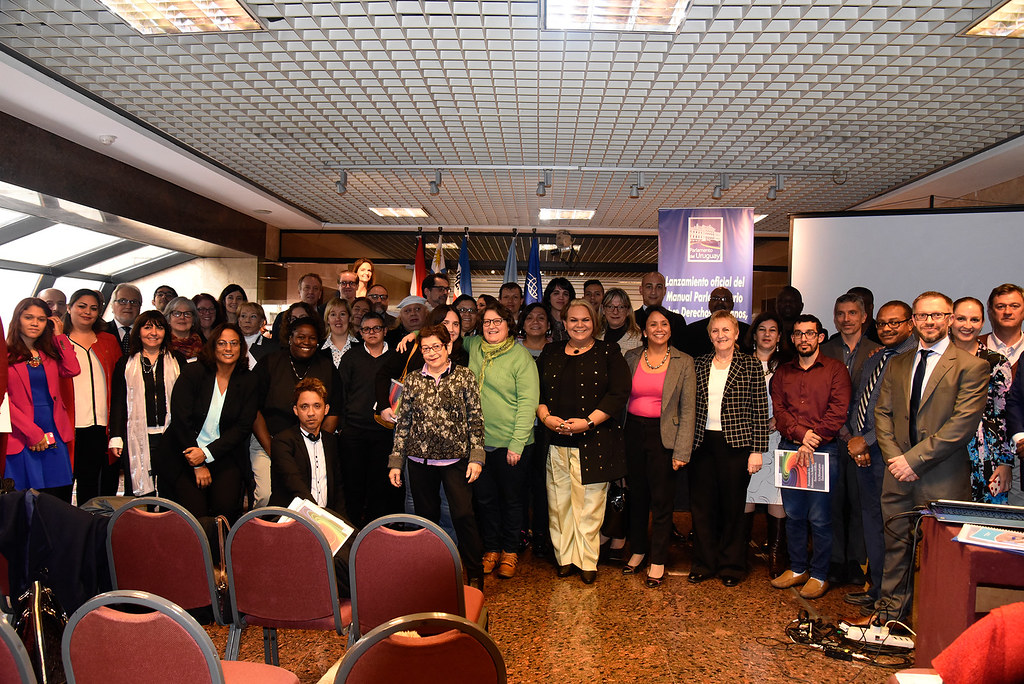
Montevideo, Uruguay
Parliamentarians for Global Action (PGA), in collaboration with the Human Rights Committee in the Parliament of Uruguay, organized a Seminar on Equality and Non-Discrimination based on Sexual Orientation and Gender Identity for Parliamentarians of Latin America and the Caribbean in Montevideo on July 11, in the sidelines of the Global LGBTI Human Rights Conference that took place from July 13 to 15 in the capital of the country.
The Seminar brought together parliamentarians from Aruba, Bolivia, Belize, Costa Rica, Dominican Republic, the Republic of Seychelles, Suriname, Trinidad and Tobago and Uruguay to discuss legislative reforms and to promote equality and non-discrimination of all individuals regardless of their sexual orientation or gender identity, deepening collaboration among parliamentarians from Latin America and the Caribbean; promote constructive dialogue between parliamentarians and LGBTI civil society organizations; review, share and exchange best practices and strategies among parliamentarians from different countries to strengthen the human rights of LGBTI persons in Latin America and the Caribbean, including regional mechanisms and national human rights institutions; and present a revised draft of Advancing the Rights and Inclusion of LGBTI people: A Handbook for Parliamentarians, prepared by PGA and the United Nations Development Program (UNDP), a tool with key information about human rights and concrete actions to raise awareness, examine, and reform the legal framework to address the needs of LGBTI persons.
A wide range of actors and key stakeholders joined this conversation, including government officials from the Ministries of Foreign Affairs of Australia, Canada, Uruguay and the Kingdom of the Netherlands – the latter two co-organizers of the Global LGBTI Human Rights Conference that began on July 13 in Montevideo - members of intergovernmental organizations such as Mr. Francisco Eguiguren, Rapporteur on the Rights of LGBTI Persons of the Inter-American Commission for Human Rights, Mr. Michael van Gelderen from the Office of the High Commissioner for Human Rights, Dr. Justin Pettit from the Commonwealth Secretariat, and officials from UNDP’s headquarters and Asia-Pacific and Uruguay’s offices.
Additionally, representatives from civil society organizations of Belize, Costa Rica, Dominican Republic, Guatemala, Jamaica, Mexico, St. Lucia, Trinidad and Tobago, Uruguay and Venezuela, as well as global NGOs such as ARC International, ILGA, Human Rights Watch, Outright Action International, and members from the donor community also participated in the deliberations. For a detailed list of participants, please consult the resource section.
To ensure a learning space and interactive discussions among all participants, the agenda was divided into two sections: a first section covered national, regional and international human rights mechanisms and standards highlighting positive developments, gaps and challenges in different countries, and the second one focused on case studies and a guided discussion based on three main themes: 1. The Handbook for Parliamentarians; 2. Effective collaboration between parliamentarians and civil society; and 3. Positive and inspiring examples in the field.
The main themes that emerged from the discussions were:
- Identify key allies among parliamentarians and civil society to build a sustained dialogue; focus on representatives who are working on the same issues.
- Create platforms of dialogue and working groups with government officials. It was suggested that the approach should be tailored: at the parliamentary level and at the municipal level respectively. Local realities should inform these choices.
- Parliamentarians should explore different avenues for policy change through the exercise of their legislative, representative and oversight roles and incorporate a gender and intersectional analysis in the preparation, analysis and discussion of all the legislative initiatives.
- Increase advocacy around parliamentary involvement through the engagement of UN initiatives such as the Sustainable Development Goals (SDGs), the Agenda 2030, the LGBT Inclusion Index led by UNDP and the creation of the UN independent expert on the subject as an opportunity to open the possibility for synergic, complementary work on the subject.
- Build relationships with national human rights institutions and strengthen relationships with regional mechanisms including the Organization of American States, the Inter-American Commission on Human Rights and the Caribbean Court of Justice.
- Reflect on the importance of the link between democracy, human rights and good governance. These concepts have to do with the foundations of government: to ensure law enforcement, security and equal access to rights for all citizens.
- Seek opportunities where regional and international spaces offer opportunities for parliamentarians and civil society to meet and exchange views. For example, the Sustainable Development Goals (SDGs) process provides a space for engagement between government and civil society on the topic.
- Take note that civil society can strengthen parliamentary meetings with information, expertise and valuable resources.
- Approaching and contacting parliamentarians is a two-way street for civil society. The answer lies halfway because both stakeholders need each other.
Parliamentarians adopted a Montevideo Action Document pledging to take concrete legislative and political actions to guarantee equal protection and inclusion of LGBTI people, including in relation to: combatting violence, stigma and discrimination against LGBTI people, and ensuring equal access to justice, education, housing, employment and health services for all citizens, regardless of sexual orientation, gender identity or expression and sex characteristics.
The adopted Action Document was shared with officials from the National Institute against Discrimination, Xenophobia and Racism (INADI, in Spanish), of the Ministry of Justice and Human Rights of Argentina who chaired Plenary Session Working Group III on Legislation and Shrinking Space for Civil Society to inform their deliberations and ensure that Parliaments’ perspective was incorporated in the final documents of the Global LGBTI Human Rights Conference.
Next steps:
- Based on the diverse recommendations, PGA’s Secretariat is designing a communications/outreach strategy to disseminate the Handbook for Parliamentarians among a wide range of stakeholders;
- Build on collaboration with NHRIs, the Commonwealth Secretariat and regional and international human rights mechanisms, including UPR recommendations;
- Follow up on the Montevideo Action Document.
This activity was possible thanks to the generous support of the Global Equality Fund (GEF) administered by the United States State Department.
PGA would also like to acknowledge the generous support of the Arcus Foundation; the Open Society Foundations; the Sigrid Rausing Trust and the Oak Foundation to PGA’s Parliamentary Campaign against Discrimination based on Sexual Orientation and Gender Identity.
Contact:
Mónica Adame
Program Director
Gender, Equality and Population Program
E:




